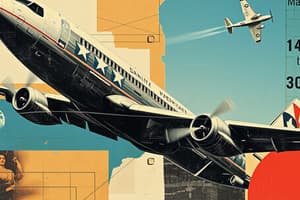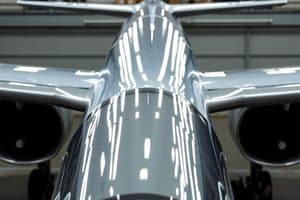Podcast
Questions and Answers
Which one of the following engines should be used by a subsonic passenger transport airplane for minimum specific fuel consumption?
Which one of the following engines should be used by a subsonic passenger transport airplane for minimum specific fuel consumption?
- Turbojet engine with afterburner
- Turbofan engine (correct)
- Ramjet engine
- Scramjet engine
The damping of the spring-mass-damper system with a mass of 1 kg, damping ratio of 0.2, and natural frequency of 5 rad/s is given by:
The damping of the spring-mass-damper system with a mass of 1 kg, damping ratio of 0.2, and natural frequency of 5 rad/s is given by:
- 0.2 kg/s
- 2 Ns/m
- 2 N/s (correct)
- 0.2 N/s
If $f(\theta) = \begin{bmatrix} cos\theta & sin\theta \ -sin\theta & cos\theta \end{bmatrix}$, then f(\alpha)*f(\beta) =
If $f(\theta) = \begin{bmatrix} cos\theta & sin\theta \ -sin\theta & cos\theta \end{bmatrix}$, then f(\alpha)*f(\beta) =
- 2x2 zero matrix
- f(\alpha+\beta) (correct)
- f(\alpha/\beta)
- f(\alpha-\beta)
An artificial satellite remains in orbit and does not fall to the earth because:
An artificial satellite remains in orbit and does not fall to the earth because:
The Euler iteration formula for numerically integrating a first order nonlinear differential equation of the form $\dot{x} = f(x)$, with a constant step size of $\Delta t$ is:
The Euler iteration formula for numerically integrating a first order nonlinear differential equation of the form $\dot{x} = f(x)$, with a constant step size of $\Delta t$ is:
The number of natural frequencies of an elastic beam with cantilever boundary conditions is:
The number of natural frequencies of an elastic beam with cantilever boundary conditions is:
For maximum range of a glider, which of the following conditions is true?
For maximum range of a glider, which of the following conditions is true?
An airplane with a larger wing compared to a smaller wing will necessarily have:
An airplane with a larger wing compared to a smaller wing will necessarily have:
The minimum value of $J(x) = x^2-7x+30$ occurs at:
The minimum value of $J(x) = x^2-7x+30$ occurs at:
Two airplanes are identical except for the location of the wing. The longitudinal static stability of the airplane with low wing configuration will be:
Two airplanes are identical except for the location of the wing. The longitudinal static stability of the airplane with low wing configuration will be:
For a fixed center of gravity location of an airplane, when the propeller is mounted on the nose of the fuselage:
For a fixed center of gravity location of an airplane, when the propeller is mounted on the nose of the fuselage:
Flashcards
Minimum Specific Fuel Consumption
Minimum Specific Fuel Consumption
The lowest fuel consumption rate per unit of thrust produced by an engine at a given speed and altitude.
Damping Ratio (ζ)
Damping Ratio (ζ)
A measure of how quickly oscillations in a system decay. It represents the ratio of the actual damping to the critical damping.
Rotation Matrix
Rotation Matrix
A transformation matrix that rotates vectors in space.
Satellite Orbit
Satellite Orbit
Signup and view all the flashcards
Euler Iteration
Euler Iteration
Signup and view all the flashcards
Natural Frequencies (beam)
Natural Frequencies (beam)
Signup and view all the flashcards
Glider Maximum Range
Glider Maximum Range
Signup and view all the flashcards
Wing Size and Stability
Wing Size and Stability
Signup and view all the flashcards
Minimum Point of Quadratic Function
Minimum Point of Quadratic Function
Signup and view all the flashcards
Wing Configuration and Stability
Wing Configuration and Stability
Signup and view all the flashcards
Study Notes
Aerospace Engineering Exam - 2007
- Duration: Three hours
- Maximum Marks: 150
- Instructions:
- Answer all 85 objective questions.
- Use an Objective Response Sheet (ORS).
- Use HB pencil to fill in the correct bubble for each question (A, B, C, D).
- Erase completely if you want to change an answer.
- Negative marking applies:
- 0.25 marks deducted for wrong answers in questions 1-20
- 0.5 marks deducted for wrong answers in questions 21-76, 78, 80, 82, 84
- No negative marking for 77, 79, 81, 83, 85
- Do not bubble more than one answer for a question.
- Unanswered questions do not earn marks.
- Fill in registration number, name, and exam center on the ORS.
- Fill in registration number and paper code using HB pencil.
- Calculator is allowed.
- Charts, graph sheets, and tables are not allowed.
- Rough work can be done on the question paper itself or on provided blank pages.
- Check all pages for discrepancies.
Question Types and Marks
- Questions 1-20: Carry one mark each
- Questions 21-85: Carry two marks each
Additional Instructions
- Question 1-20: One mark each
- Question 21-75: Two marks each
Studying That Suits You
Use AI to generate personalized quizzes and flashcards to suit your learning preferences.




